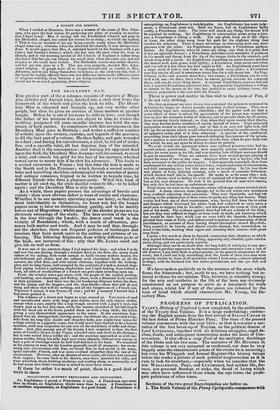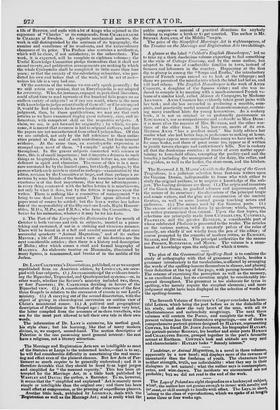PROGRESS OF PUBLICATION.
VALPY'S History of England is now completed, by the publication of the Twenty-first Volume. It is a large undertaking; embracing the English annals from the first arrival of Jumus CESAR to the last defeat of Prime Minister PEEL. The time of the present volume commences with the year 1824; so that it contains a narrative of the first break-up of Toryism on the political demise of Lord LIVERPOOL, together with its delirious struggles, rapid decline, death, and subsequent resurrection under the name of Conservatism. It also offers a coup erceil of the multiplex doublings of the Duke and his two men. The narrative of Mr. HUGHES in this volume is not very animated or condensed, nor does he vely happily seize the characteristic points of the events he is narrating; but even his 'Whiggish and Annual Register-like history brings before the reader a picture of such political tergiversation as it is .vain to look for elsewhere,—especially when we consider that the trio WELLINGTON, PEEL, and LYNDHURST, had neither life, fortune, nor personal freedom at stake, the dread of losing which may often have influenced those whom the age terms the profligate politicians of other times.
Sections of the two great Encyclopredias are before us. I. The Sixth Volume of the Penny Cyclopodia commences with a life of BUFFON, and ends with a lot of kings who rejoiced in the cognomen of " Charles " or its compounds, from CHARLEMAGNE to CHARLES of Sweden. As regards mechanical matters, the work is still distinguished by the neatness of its typography, the number and excellence of its wood-cuts, and the extraordinary cheapness of its price. The Preface also contains a notificatien, which will be clear, if not satisfactory, to the subscribers. The work, it is expected, will be complete in eighteen volumes; the Useful KnoWledge Committee pledge themselves that it shall not exceed twenty, and publication arrangements are making by which the whole Cyclopsodia shall be completed in little more than four years ; so that the anxiety of the calculating subscriber, who predicted his own end before that of the work, will be set at rest— unless his life is a very bad one. Of the contents of the volume we can only speak generally ; for we still retain our opinion, that an Encyclopmdia is not adapted for reviewing. Who, for,instance, engaged in periodical literature, could afford time to read upwards of five hundred folio pages on an endless variety of subjects ? or if any one could, where is the man with knowledge to judge scientifically of them all ? or if he attempted it, would he find readers for his own lucubrations ? Limiting our judgment, then, by these qualifications, we may say that such articles as we have examined display great industry, care, and information, with competent skill on the respective subjects. A claim, we see, is put forward for originality ; by which, we presume, it is meant that recourse is had to original authors, and that the papers are not manufactured from other Cycloprodias. Of this we are satisfied, not only by the full reference to their authorities printed at the end of each contribution, but from internal evidence. At the same time, an encyclouredic expression is stamped upon most of them. "I compile" might be the motto throughout. In the graver subjects connected with science or facts, this is of small importance; but it imparts a dryness to such things as biographies, which, in the volume before us, are rather deficient in spirit and character. The cause of this is in a measure accounted for by the limited space, but chiefly, perhaps, by the process which each article is stated to undergo—examination by the editor, revision by the Committee at large, and then perhaps a rerevision by some friends of the Society. In treatises where minute exactness is of the first importance, this may be advantageous ; in every thing connected with the belles lettres it is mischievous, not only by What it does, but by the fetters it imposes upon the writer. There is nothing like a committee of' management " to bring to one dead level every mind." The space allowed to a paper must of course be settled: but the less a writer has before him of the responsibility of the fifty-and-one Lords, Right Honourables, M.D.s, M.P.s, and F.R.S.s, who form the Committee, the better for his animation, whatever it may be for his facts.
2. The Part of the Encyclopeedia Britannica for the month of October is both various and rich in subjects, treated in a painstaking and sustained, if not in a striking and vivacious manner. There will be found in it a full and careful account of that once successful quackery "Animal Magnetism," and of its author MESNER ; a life of ManomEr and a view of his doctrine are the next considerable articles ; then there is a history and description of Malta ; after which comes a staid and formal biography of MALTHUS. An elaborate treatise on Mammalia, illustrated by many figures, is commenced, and breaks of in the middle of the
Jerboa. •



























 Previous page
Previous page